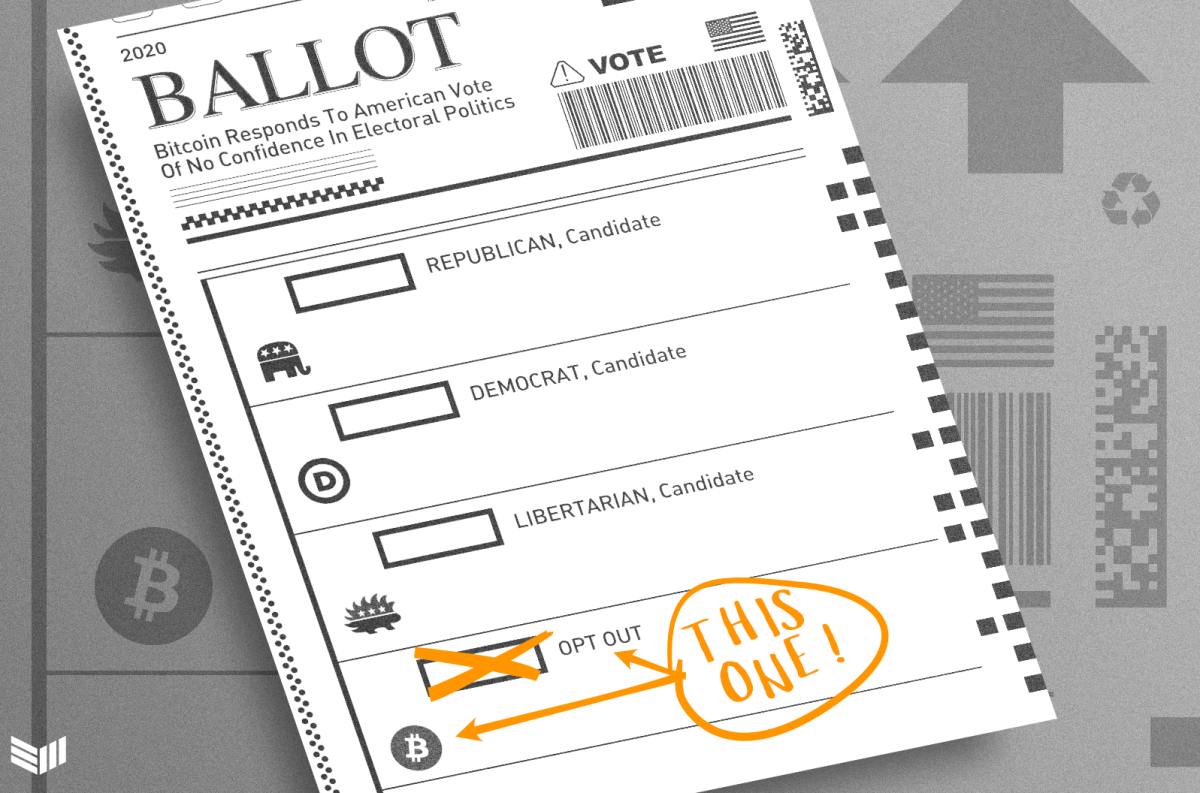
“As a contested election deepens a crisis of legitimacy, Bitcoin presents an alternative to the existing system of governance.”
The 2020 U.S. Presidential Election swept over the nation with chaos and turmoil. The election mess, with alleged voter fraud, ballot tampering and the removal of Republican election observers challenged the notion of a fair and free election. On the Saturday after Election Day, when major news networks and the Associated Press called the presidential race for Joe Biden, disputes over the outcome with recounts and federal lawsuits quickly fended off the blue waves that were spreading in Democratic states.
In the midst of the increased tension, when the American people showed a vote of no confidence in the integrity of the electoral process, the bitcoin price surged to over $15,000, marking the highest mark since its all-time high historic run in 2017. Tyler Winklevoss, co-founder and CEO of the Gemini cryptocurrency exchange,
The rise of #Bitcoin is a referendum on politicians, governments, and bankers around the world.
— Tyler Winklevoss (@tyler) November 5, 2020
">tweeted:
Bitcoin, which came into existence in the aftermath of the 2008 financial meltdown, has shown steady development over the past 12 years. With an ability to “be your own bank,” this open-source electronic cash began to enable financial freedom. Now, as a contested election deepens a crisis of legitimacy, Bitcoin presents an alternative to the existing system of governance.
Electoral Politics As System Of Control
The disarray of the U.S. presidential election began to reveal the true nature of the political system that is presented as democratic. Electoral politics is a system of control, designed by wealthy elites to maintain their power — a representative form of government that is built hierarchically to fragment the interests of people within the system. This creates a fertile ground for identity politics.
The oligarchic class, which has no allegiance to any country, exploits people’s national identity, placing their interests in opposition to the interests of people who were born and live in other countries. Within a unit of nation-state, they further divide interests of each citizen into subsets of categories based on race, gender, religion and class. They then pit one group against another to make them compete for their interests.
By using the mascots of a donkey and an elephant and red and blue flags as props, those in power enact a political theater to create an illusion of democracy. Corporate masters behind the scenes, by pulling the strings of puppet politicians, corral the American populace into camps of Democrats and Republicans. Every election cycle, they successfully make voters chase after empty campaign slogans. From chanting “Make America Great Again” to “Black Lives Matter,” people fight to defend their loyalty to a group and be sucked into a rigged game that they are guaranteed to lose.
Identity Politics 2.0
Now in the New Digital Age where technologies are reshaping the world, this managed democracy is administered by technicians, engineers and internet entrepreneurs. The Silicon Valley tech giants, through their monopolies, have made the world population subject to their terms and conditions that restrict free speech and violate privacy rights.
The social media conglomerates, through algorithmic control, interfere with the civil process of nations. They are now working around the clock, social engineering “divide and conquer” to influence U.S. politics. Slogans like “Count Every Vote!” and “Stop The Steal!,” as pro-Trump and pro-Biden demonstrators levy, inflame hatred among Americans in cyberspace.
Facebook, which has now become the biggest social network worldwide with over 2.7 billion monthly active users, has been deliberately disenfranchising conservatives by banning protest groups and deleting pages of Trump supporters on its platform.
Twitter, which was accused of suppressing stories about the Hunter Biden laptop scandal just before the election, now engages in outright censorship. In the name of securing the integrity of U.S. election efforts, this San Francisco-based social networking site flags content with a blue checkmark, removing information that criticizes and challenges the official narrative of “Biden, the president-elect,” as false and misleading about the election. During the heated battle to win 270 Electoral College votes, the company has deleted Sitting President Trump’s tweets dozens of times. Recently, it also suspended a U.S. pollster and statistician who was reporting on the disputed election.
The Global Reset
Now, as the election drama continues to polarize the nation, exacerbating a bipartisan controlled demolition of the republic, a transition plan is swiftly being rolled out. With the slogan of “Build Back Better Economy,” the media-anointed president-elect begins to assemble his cabinet.
Joe Biden’s new Pentagon transition team, drawn from hawkish think-tanks funded by arms manufacturers, is gearing up to expand the military-industrial complex. With a new technology industry task force possibly led by the former Google Chief Executive Eric Schmidt, a roadmap is being developed for the implementation of AI technology and automation of a war economy.
While the system is going through a reset, new solutions are emerging outside of the electoral arena on the edges of the internet. The Cypherpunks, a loose online collective that builds liberty-enhancing software, provide choices for people to opt out of the user-subjugating global program.
Individual Sovereignty
Bitcoin is a project of free software that gives users full control of their digital wealth. At the core of this technology is the value of individual sovereignty. It is the recognition of the individual as the highest power, from which all of its own power and authority are derived.
Bitcoin’s consensus algorithm, through the method of decentralization, allows each person to directly connect with and act out of his or her own self interests. The genius of its economic incentive structure that places the value of individuals over the collective, with a careful balance of risk and rewards, aligns the self-interests of all participants in a network without applying pressure.
This makes Bitcoin antifragile, preventing a fluctuation of the network that could become vulnerable to identity politics and manipulation, enabling the immutability of mathematics to maintain the integrity of the system.
Transnational corporations, through their commercially-driven globalization, have hijacked governments. They have subordinated the sovereignty of nations to their monopoly of the market that endlessly pursues profit at any cost. Through lobbying politicians in Washington, special interests groups pushed through neoliberal trade deals like WTO and TPP, shipping manufacturing and exploiting workers overseas with cheap labor, creating joblessness and ghost towns in America.
As their unfair competition created a race to the bottom, perpetuating wars, poverty and environmental destruction, Bitcoin offers a new game. Brutal competition of selfishly-driven individuals in a transparent and open market where rules are applied to everyone equally, doesn’t destroy a network. Instead it increases the security for the entire system, enriching everyone in a network.
Innovating Future
Bitcoin’s truly free market, maintained by its users running full nodes that check and enforce the rules of consensus, has begun to create a new economy, through people coming together in freedom and engaging in a labor of love. Now, the rise of the bitcoin price continues to foster enthusiasm in people, creating new jobs and opportunities. The ecosystem that has developed around this currency inspires memes and art, creating a golden age of freedom of speech. Celebrating this coming of a new renaissance, Max Keiser and Stacy Herbert, Bitcoin pioneers and hosts of a popular financial analysis broadcast, have launched a new podcast, welcoming their audience into a hyperbitconized post nation-state world.
In observing the corruption of the American political establishment, Keiser
#Bitcoin is ushering in a post-politics era
Politics, the art of the social contract, has been obviated by the perfect governance code of BTC
Sociology will also be obliterated as BTC creates perfect incentives and perfect outcomes
The neocons will get mowed down
— Max Keiser (@maxkeiser) November 14, 2020
">tweeted:
The Orange Pill podcast that invites a new guest from the Bitcoin world every Sunday, now with over 14 episodes, is growing its viewers every week. It creates an interactive and participatory new media, in which Keiser and Herbert use their Telegram group chat to bring in Bitcoiners from around the world together to inspire and educate one another.
While ideological conflicts and political divides of left vs. right now create more chaos, leaders of institutions and governments with a message of “We Are All in This Together” try to unite all nations under their single vision. As their top-down solutions homogenize diverse cultures and squash individual uniqueness, Bitcoin’s network of consensus created through each person’s voluntary association and mutual aid allows us to create a new world capable of embracing our differences.
From pandemic to economic crisis, solutions to the problems can be found by ordinary people working together to innovate a better future. Bitcoin, an autonomous network of equal peers, every 10 minutes strengthens unity in diversity, securing liberty for all and creating peace around the world.
This is a guest post by Nozomi Hayase. Opinions expressed are entirely her own and do not necessarily reflect those of BTC Inc or Bitcoin Magazine.










